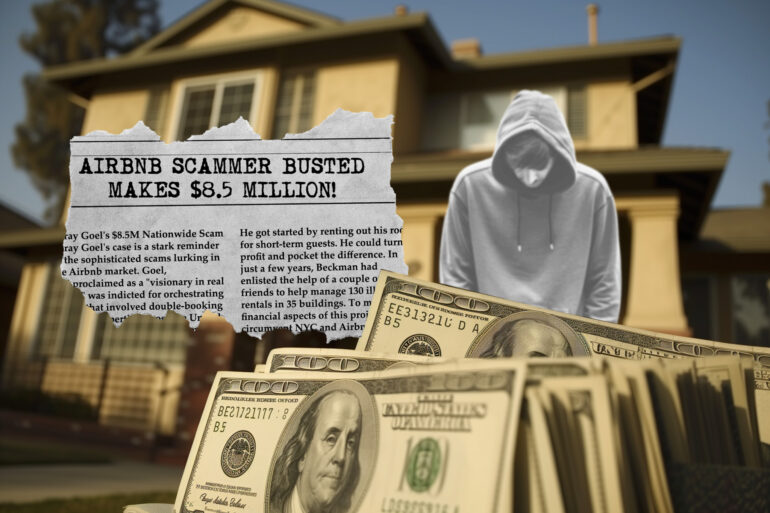This Airbnb Fake Host Scammer made $8.5 Million!
In recent years, Airbnb has transformed from a simple lodging option into a lucrative investment channel. Real estate investors, big and small, have been drawn to the potential of Airbnb properties as a source of steady income and property value appreciation. However, as with any rapidly growing sector, this trend has not been without its challenges.
One significant concern is the prevalence of scams within the Airbnb market. These deceptive practices harm unsuspecting guests and pose a severe threat to genuine investors and the integrity of the Airbnb community. That means investors must stay informed and vigilant, ensuring their venture into Airbnb is both profitable and secure.
Legitimate investors who have poured time and resources into creating genuine, quality Airbnb experiences often find themselves caught in the crossfire.
Unveiling the Scams: High-Profile Cases
Shray Goel’s $8.5M Nationwide Scam
Shray Goel’s case is a stark reminder of the sophisticated scams lurking in the Airbnb market. Goel, self-proclaimed as a “visionary in real estate,” was accused of orchestrating a scam that involved double-booking over 100 properties across the United States. His operation, which amassed $8.5 million, was built on deceit: guests were often canceled at the last minute or moved to inferior properties under false pretenses, like non-existent plumbing.
The scam was pretty straightforward: Goel would post multiple listings for the same property at different places for the same nights. Essentially, the highest bidder was able to rent a particular property. Lower-paying guests were canceled or switched to different properties in the area. In some cases, Goel would use fake hostnames or other people’s identities to list properties, including properties he didn’t own.
The legal consequences for Goel could be severe. He faces charges of wire fraud, aggravated identity theft, and criminal forfeiture. The FBI FDIC-OIG is investigating. This case highlights the intricate nature of some Airbnb scams and warns about the serious legal repercussions for those who engage in such fraudulent activities.
New York City’s $20 Million Illegal Rental Network
In the heart of New York City, a more complex scheme was unfolding. Max Beckman led a network of scammers who operated over 130 illegal short-term rentals. This operation, which generated over $20 million, was built on fake accounts, reviews, and photos, deceiving guests and circumventing city laws prohibiting renting out entire apartments for less than 30 days.
He got started by renting out his room for short-term guests. He could turn a profit and pocket the difference. In just a few years, Beckman had enlisted the help of a couple of friends to help manage 130 illegal rentals in 35 buildings. To manage the financial aspects of this project and circumvent NYC and Airbnb policies, this team created 18 corporations and more than 100 Airbnb accounts.
The legal response was swift and decisive. The New York Attorney General’s Office and the New York City Sheriff’s Office conducted a year-long investigation, leading to raids and the seizure of evidence. The lawsuit accused Lee and his associates of multiple violations, including deceptive business practices. The defendants, facing serious charges, highlighted the risks and consequences of engaging in fraudulent rental activities. The lawsuit has yet to be decided, but the results could impact honest investors who use Airbnb to legally host short-term renters.
The Ripple Effect of Scams on Real Estate and Airbnb’s Image
The impact of these scams extends far beyond the immediate victims. They overshadow the broader real estate market, particularly in short-term rentals. For Airbnb, these incidents threaten the brand’s reputation as a trusted marketplace. Trust is the cornerstone of the sharing economy, and when that trust is shaken, it can have far-reaching implications.
Legitimate investors who have poured time and resources into creating genuine, quality Airbnb experiences often find themselves caught in the crossfire. The fallout from these scams can lead to increased scrutiny and tighter regulations, which, while necessary for consumer protection, can sometimes inadvertently burden honest hosts. On the other hand, guests may become more cautious or skeptical when booking rentals, impacting booking rates and the overall perception of Airbnb as a reliable accommodation option.
Tighter Regulations in Major Cities Affecting Airbnb Properties
Paris
2015: Crackdown on secondary apartments set up as short-term rentals, with fines up to €25,000.
2017: Requirement for Airbnb landlords to register homes and display registration numbers.
2019: Mayor’s plan to impose a €12.5 million fine on Airbnb for unregistered ads.
2021: All listings for entire homes available for short-term rentals must display a registration number.
Barcelona
2018: Airbnb instructed to remove listings operating without a city-approved license.
Agreement: Airbnb and the city agreed to share listing data for better regulation.
Current Rule: Mandatory registration as tourist accommodation for short-term rentals.
Berlin
2014: Law passed banning short-term rentals without permission from the Berlin Senate.
2018: Overturning of the 2014 law, allowing rentals of primary homes without time restrictions and second homes for up to 90 days annually.
2021: The requirement for Airbnb listings is to provide a registration number or contact details.
Amsterdam
2015: Cooperation with Airbnb to levy a tourist tax on rentals.
2018: Limitation of short-term rentals to 30 days a year.
2021: Requirement for both a registration number and a permit for vacation rentals.
London
2015: Amendment allowing homeowners to rent their properties for up to 90 nights a year.
New York City
Law prohibits renting out entire apartments or homes for fewer than 30 days unless the host is present.
2023: Enforcement of the law led to removing thousands of listings.
San Francisco
Requirements: Hosts must be full-time residents, live in the unit for at least 275 days a year, and can rent it out for no more than 90 days.
Certificates: Business and short-term rental registration certificates are needed.
2019: Investigations revealed false residency claims by applicants for short-term rental permits.
Santa Monica, Calif.
2015: Introduction of strict regulations requiring hosts to live on the property during the renter’s stay and to register for “home sharing.”
2019: Agreement with Airbnb to remove illegal listings, significantly reducing registered short-term rental properties.
It may seem like these strict regulations only impact larger cities, but it’s only a matter of time before other popular vacation destinations create their own rules. For example, properties that count as vacation rentals in Florida must be licensed through the Florida Department of Business and Professional Regulations (DBPR), pay appropriate taxes, and follow some other rules. Many HOAs and condo associations ban short-term and vacation rentals, and more will follow suit if rental scams continue to grow. Check with your community, city, and state guidelines before hosting via Airbnb.
The key for investors is to stay informed about changes in Airbnb’s policies and local regulations affecting short-term rentals.
Navigating the Future of Airbnb Investments
Aware of the challenges these scams pose, Airbnb has been actively working to enhance its platform’s security and trustworthiness. The company has implemented more rigorous verification processes for hosts and guests, improved its review system to ensure authenticity, and strengthened its customer support for dispute resolution. These measures aim to rebuild and maintain the trust essential to the platform’s success. Of course, scammers are always on the lookout for new ways to exploit the system.
The Outlook for Real Estate Investors
For real estate investors, the evolving landscape of Airbnb presents both challenges and opportunities. The increased scrutiny and regulations may require more diligence and adaptability, but they also serve to protect genuine investors and guests alike. The key for investors is to stay informed about changes in Airbnb’s policies and local regulations affecting short-term rentals. It’s also worth being aware of common Airbnb scams to ensure your listing stands out. For example, one major red flag for guests is if the listing doesn’t have enough photos or if the images are altered. To stand out as a legitimate property, make sure you have high-quality images of the interior and exterior of the property, along with a few shots of the neighborhood.
By staying informed, vigilant, and ethical, investors can contribute to a healthier, more secure Airbnb market, benefiting themselves, their guests, and the community.
The Balanced Path in Airbnb Investing
The journey of investing in Airbnb properties is filled with potential rewards, but it also requires heightened awareness and due diligence. The cases of reported and prosecuted Airbnb scams underscore the importance of being vigilant and proactive in protecting your investment and your guests.
As an investor, balancing the pursuit of profit with the responsibility of providing a safe, authentic, and high-quality experience is essential. That means adhering to Airbnb’s guidelines and local regulations and engaging in ethical practices that foster trust and reliability in the Airbnb community. While the path of Airbnb investing might have complexities, navigating it with caution, knowledge, and a commitment to integrity can lead to a rewarding and sustainable venture. By staying informed, vigilant, and ethical, investors can contribute to a healthier, more secure Airbnb market, benefiting themselves, their guests, and the community.








